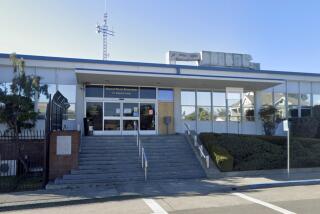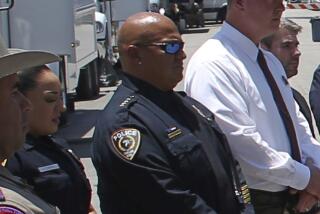Brutal Cops, Brazen Thugs Wage Ugly War in Jamaica
- Share via
BRAETON, Jamaica — It was before dawn when an elite squad from one of the deadliest police forces on Earth quietly passed the flower boxes, trimmed lawns and sleeping roosters on Fifth Seal Way and approached the ramshackle concrete house where seven young men would die.
The police later would call it a shootout with street thugs who had killed a school principal and a cop: Justice had been done. Human rights groups in Jamaica and abroad would label it coldblooded murder--the worst of many judicial travesties by a vengeful force serving as judge, jury and executioner.
But for those who live and work in this lower-middle-class suburb of the Jamaican capital, the March 14 raid has become a flash point in a cycle of violence between an embattled and oppressive police force and brazen gangs of killers--with the vast majority of Jamaicans caught in the cross-fire.
“There’s a war going on right now between the police and the citizens,” said Gem Hyatt, the stern principal of nearby Braeton Primary and Junior High School. “The police are being killed. The citizens are being killed. And I don’t know how we’re going to deal with it.”
During the past 10 years, the Jamaica Constabulary Force has blown away, on average, 140 civilians a year in this Caribbean island nation of 2.6 million people--the highest rate in the world, Amnesty International says.
At the same time, however, 114 police have been gunned down in more than 1,000 shootouts since 1988--the overwhelming majority of the incidents far from the Jamaican tourist meccas of the north. Most of the bloodshed is confined to metropolitan Kingston, the gang-ridden, largely impoverished capital where, routinely, more than 900 slayings take place a year--one of the world’s highest homicide rates.
By comparison, the Los Angeles Police Department reports that an average of 17 civilians a year have been killed in officer-involved shootings over the past decade, in a population of about 4 million. And 194 L.A. police officers have been killed in the line of duty since 1907, when records were first kept.
In the eye of the storm is Commissioner Francis Forbes, a 31-year police veteran who has struggled during his five-year tenure as head of the 7,000-member Jamaica Constabulary Force to balance crackdowns on violent crime with human rights training and reform.
“None of us can say we are satisfied with the level of fatalities that involve police. And that goes both ways,” Forbes said last week, referring to officers on either side of the gun. He was reacting to a blistering Amnesty International report titled: “Jamaica Killings and Violence by Police: How Many More Victims?”
Forbes angrily called the report “one-sided,” adding: “In order to see the accurate picture, you have to see where we are coming from. Before this past decade, fatal shootings by police were in excess of 300 a year. . . . The numbers have been coming down.”
Jamaica’s culture of violence is rooted in politics. Gang-run ghettos called garrisons were heavily armed by the nation’s two main parties in the 1970s and ‘80s. Vicious turf wars were routine, as were harsh police crackdowns to end them.
“But drugs are in charge of the gangs now, and the drugs are in control of the guns,” Forbes said, acknowledging that Jamaica’s role as a key transshipment point for Colombian cocaine headed to the U.S. has made Kingston’s gangs more unpredictable and deadly--and has corrupted some police as well.
A steady stream of hardened criminals deported from U.S. prisons in recent years under tough American immigration laws has made the challenge all the fiercer, Forbes said.
Nonetheless, Forbes said, all members of the constabulary have now taken mandatory human rights classes. He has hired consultants from Britain and the U.S. to further professionalize the force. And his officers are now required to view “shoot or don’t shoot” training tapes produced by the LAPD.
In the past decade, more than 130 officers have been fired for improprieties, Forbes said, and a dozen or so have been convicted of offenses ranging from assault to murder.
“On the scale of 1 to 10 in trying, I think the Jamaican force deserves a 9,” he said, adding, “We are not a perfect force, and we have some elements that, if I had the power, I’d take them out tomorrow.”
Despite the Braeton killings and the outcry by Amnesty and several increasingly vocal Jamaican human rights groups, Forbes said, “more and more of the silent majority in Jamaica who support the police now are speaking out.”
And yet, Forbes acknowledged that the Braeton incident “couldn’t have happened at a worse time.”
Carolyn Gomes, a pediatrician who heads Jamaicans for Justice, takes a different view. “Maybe,” she said, “Braeton couldn’t have come at a better time--if it had to happen at all.”
Gomes’ human rights group was formed nearly two years ago to work within Jamaica’s moribund judicial system to combat police brutality. It provides lawyers for relatives of victims. Its members routinely attend coroner’s inquests, and its leaders lobby for police and judicial reform.
“We’re having public discussions now and forcing people to look at things they’ve been closing their eyes to for years,” she said. “More and more people are realizing we cannot build a nation like this.”
Of Forbes and his force, Gomes added: “I think they’re trying. But no one is standing up and just saying: ‘No! This is wrong.’ Forbes must distance himself completely from these extrajudicial killings. And he hasn’t.”
The recently formed Families Against State Terrorism has come out even more strongly against the police, accusing them of targeting mostly poor, unemployed ghetto dwellers.
The group has taken the lead in representing the families of the so-called Braeton Seven. At a news conference last week, a procession of women and men whose sons and daughters have been killed by police in the past year took the podium to plead for justice. Among them was Dorcy Whyte, whose 19-year-old son, Dane, was one of the Braeton Seven. Police, Whyte said, “just came there that morning to kill.”
The official autopsy report on the seven, who ranged in age from 15 to 20, has yet to be released. But an Amnesty International pathologist allowed to attend the autopsies concluded that all seven had, in effect, been executed--all were shot in the head at close range, and six had been shot more than once.
Forbes declined to comment on details of the Braeton case, which is the subject of internal investigations. But he confirmed reports that police had found at least two pistols in the house linking the men to several brutal slayings.
One of the victims in those slayings was a police officer, Constable Dwight Gibson. He was shot dead along with a customs agent at the remote Above Rocks Police Station about 25 miles from Braeton.
The last alleged victim of the Fifth Seal Way Gang, as some locals privately call them, was a school principal. He was shot in the back as he ran from an armed robbery at a Braeton bar.
Still, the co-leader of Families Against State Terrorism, lawyer Miguel Lorne, said: “Even if persons who were in that house shot the policeman in Above Rocks and the teacher in Braeton, they should be arrested and brought into the judicial system.”
Instead, this is what happened that morning, according to Claude Mills, a feature writer for the daily Jamaica Gleaner newspaper who lives on Fifth Seal Way.
In a first-person account that ran in the paper, Mills described hearing desperate appeals for mercy in the Jamaican patois, followed by gunshots. “A few minutes before 7 a.m.,” he wrote, “I heard a voice crying out from inside the house on Fifth Seal Way:
“ ‘Whoi, no kill me. Mama, dem a go kill me. Mama, dem a go kill me. Dem a go ki . . . ,’ the voice screamed before being cut short by more [gunshots].
“A woman screamed, ‘Murder!’ My bowels felt weak.”
Beyond the human rights groups’ detailed critiques of what they describe as a typically tainted crime scene--and the lengthy Amnesty International pathologist’s report on the post-mortems--Hyatt, the school principal, says there are three important lessons to be learned as Jamaica gropes for solutions to the broader problem.
“The boys were not innocent, but they were all our children,” she said.
“Number two, the police aren’t policing themselves properly, and, if they don’t, then they end up going the same way as the criminals.
“But mostly,” she concluded, “I blame the parents. I wish I could say to all the parents of these seven boys: ‘You take the blame. You had so many warnings, and you did nothing.’ ”
More to Read
Sign up for Essential California
The most important California stories and recommendations in your inbox every morning.
You may occasionally receive promotional content from the Los Angeles Times.










